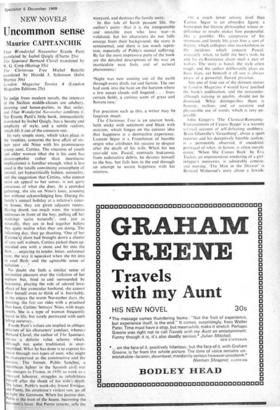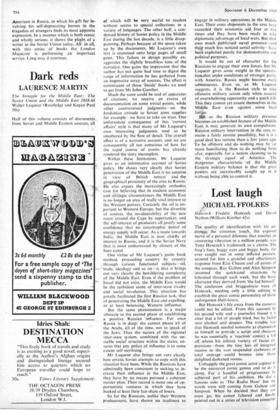NEW NOVELS
Uncommon sense
Maurice CAPITANCHIK
That Wonderful November Ercole Patti translated by Isabel Quigly (Chatto 21s) The Spaniard Bernard Clavel translated by W. G. Corp (Harrap 35s) The Christmas Tree Michel Bataille translated by Harold J. Salemson (John Murray 30s) London Magazine Stories 4 (London Magazine Editions 25s) To judge from modern novels, the interests of the Sicilian middle-classes are adultery, shooting and house-parties, in that order, and That Wonderful November confirms it. Yet Ercole Patti's little book, immaculately translated by Isabel Quigly, has a beauty and simplicity of style, and a subtle realism, which lift it out of the common run.
Its very simple story, which takes place in the 'twenties, concerns the love affair of six- teen year old Nino with his promiscuous young aunt, Cettina. The situation of youth and older woman (that she is his aunt has claustrophobic rather than incestuous implications) is familiar enough, what is less usual is the totally convincing atmosphere of amoral, yet hypocritically hidden, sensuality, and the suggestion that Cettina, who cannot resist an appeal to her senses. is not quite conscious of what she does. At a crowded gathering, she sits on Nino's knee, arousing him without acknowledging him. During the family's annual holiday at a relative's coun- try house, they are given adjacent rooms. Having drunk too much wine, the woman undresses in front of the boy, pulling off her stockings 'quite naturally', and, just as naturally, they are in bed together before they quite realise what they are doing. The following day, they go shooting. 'One of her [Cettina's] shots had brought down a cluster of very soft walnuts. Cettina picked them up. smashed one with a stone and bit into the flesh ... enjoying its tender, bitter, unformed taste, the way it squeaked when she bit into its cool flesh, and the agreeable sense of violation . .
No doubt she feels a similar sense of instinctive pleasure over the violation of her nephew but, bred to and surrounded by hypocrisy, playing the role of adored love- object of her avuncular husband. she cannot allow herself even to think of it. Inevitably, as she enjoys the warm November days, the shooting, the fast car rides with a practised Don Juan, Cettina 'betrays' Nino, with tragic results. She is a type of woman frequently found in life, but rarely portrayed with such telling accuracy.
Ercole Patti's values are implied in oblique criticism of his characters' conduct, whereas Bernard Clavel, the author of The Spaniard, creates a definite value scheme which. although not quite traditional, is over- simplified. What he has done is to express his vision through two types of men, who might be characterised as the constructive and the careless. The former, Pablo Sanchez, a republican fighter in the Spanish civil war who escapes to France, in 1939. to work as a vineyard labourer, struggles to rehabilitate himself after the shock of his wife's death. The latter, Pablo's work-shy friend Enrique, and Pierre, his employer's violent son. go off to fight the Germans. When his patron diet, Pablo is the man of the house. becoming the patronne's lover. But Pierre returns, sells the
vineyard, and destroys the family unity.
In this tale of harsh peasant life, the author's point—that it is the irresponsible and unstable men who love war—is validated, but his characters do not fully emerge from their background; the story is sentimental, and there is too much repeti- tion, especially of Pablo's mental suffering. By far the most impressive parts of the book are the detailed descriptions of the way an inarticulate man feels, and of natural phenomena: 'Night was now coming out of the earth through every ditch, rut and furrow. The sun had sunk into the haze on the horizon where a few russet clouds still lingered . . . from certain fields, a curious scent of grass and flowers rose.'
For precision such as this, a writer may be forgiven much.
The Christmas Tree is an uneven book, both sticky with sentiment and bleak with stoicism, which hinges on the curious idea that happiness is a destructive experience. Laurent Sigur is a Frenchman of humble origin who attributes his success to despair after the death of his wife. When his ten year-old son. Pascal, contracts leukaemia from radioactive debris, he devotes himself to the boy, but fails him in the end through an attempt to secure happiness with his mistress. On a much lower artistic level than Camus, Sigur is an absurdist figure, a homespun but literate philosopher whose in- difference to results makes him purposeful. like a gambler. His acceptance of his strenuous and lonely life gives him a sort of dignity, which collapses into mawkishness in the incidents which concern Pascal. esnecially when, to fulfil the boy's wish, he and his ex-Resistance chum steal a pair of wolves. The story is banal, the style often rough. and the author deliberately plays on basic fears, yet beneath it all one is always aware of a powerful, flawed presence.
Any one of four out of the thirteen stories in London Magazine 4 would have justified the hook's publication, and the remainder. although varying in quality, should not be dismissed. What distinguishes them is honesty, realism, and an accurate and pleasurable use of words, which is very en- joyable.
John Ginger's The Classical-Romantic- Expressionism of Casare Beppo' is a warmly sat•rical account of self-defeating snobbery. Brian Glanville's 'Greenburg', about a sport reporter and his deceptively humble acolyte, is a pertinently observed, if anecdotal, portrayal of what, in fiction, is often merely comic. 'When She Comes Back' by Eva Tucker. an unpretentious rendering of a girl- refugee's memories, is admirably concise, and moving. 'The Man in the Drawer' is Bernard Malumud's story about a Jewish-
American in Russia, in which his gift for in- volving his self-deprecating heroes in the tragedies of strangers finds its most apposite expression. In a manner which is both comic and wholly serious, it shows the plight of a writer in the Soviet Union today. All in all, with this series of books the London Magazine is performing an important service. Long may it continue.







































 Previous page
Previous page